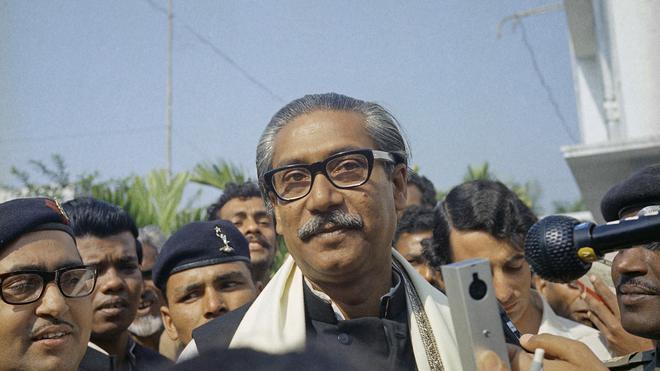Wading into the ongoing Canada-India row over Ottawa’s allegations of Indian involvement in the June 2023 murder of Khalistan Tiger Force chief Hardeep Singh Nijjar, Bangladesh has now accused Canada of sheltering “murderers”.
In an interview to the India Today TV network, Bangladesh Foreign Minister A.K. Abdul Momen raised his country’s concerns about the continued presence of S.H.M.B. Noor Chowdhury in Canada since 1996. Mr. Chowdhury is one of the key accused in the 1975 assassination of Bangladesh’s then-President Sheikh Mujibur Rahman and most of his family. Sheikh Mujib’s daughter Sheikh Hasina is the current Prime Minister of Bangladesh.
“Canada must not be a hub of all the murderers. The murderers can go to Canada and take shelter, and they can have a wonderful life while those they killed, their relatives are suffering,” Mr Momen said.
Killer gets asylum
Dhaka’s quest to bring Sheikh Mujib’s killers to justice has been thwarted by Canada, which granted political asylum to Mr. Chowdhury, and has refused to extradite him, mostly because he has been given the death penalty in the Mujib assassination case.
Several witness accounts from the night of August 14, 1975 say that it was Mr. Chowdhury who fired the bullets that killed the founder of Bangladesh. His role in the assassination of Sheikh Mujib and most of his family is often recollected during the national day of mourning that Bangladesh marks on August 15 every year. The other former army officer who is a co-accused in the case and was given the death penalty is Rashed Chowdhury, who has remained in the United States since the 1990s.
Eluding justice
The ongoing controversy between India and Canada has given Dhaka the opportunity to remind the world that one of the most wanted men in Bangladesh has eluded the arm of justice till now. “Our judiciary is very independent and the government cannot intervene in that. If he comes back to Bangladesh, both Noor Chowdhury and Rashed Chowdhury can ask for a mercy petition to the president of the country,” Mr. Momen said.
The new regime that took over in Dhaka after the assassination of Sheikh Mujib ensured immunity for the killers through an amendment in the Bangladeshi constitution. Both the accused served in the diplomatic missions of Bangladesh for nearly two decades and subsequently reached the U.S. and Canada after Sheikh Hasina, one of the two surviving daughters of Sheikh Mujib, was elected PM of Bangladesh in a landmark victory in 1996. Ms. Hasina ended the provision of immunity for the accused in the Constitution and a lower court in Bangladesh awarded the death penalty to the accused in the case, which was subsequently upheld by the Supreme Court of Bangladesh in 2009.
‘Safe haven for terrorists
Mr. Momen is the second regional leader from South Asia to seek accountability from Canada over disagreements over human rights-related cases. Earlier, Sri Lanka’s Foreign Minister Ali Sabry indicated that Colombo objects to the presence of pro-LTTE elements in Canada. “Some of the terrorists have found safe haven in Canada. The Canadian PM has this way of just coming out with some outrageous allegations without any supporting proof. The same thing they did for Sri Lanka, a terrible, total lie about saying that Sri Lanka had a genocide. Everybody knows there was no genocide in our country,” Mr. Sabry told news agency ANI.
During the decades of Tamil-Sinhala ethnic tensions in Sri Lanka and the LTTE’s terror campaign, a sizable number of the Tamil diaspora from Sri Lanka moved to Western countries such as Canada, the U.S., the U.K., and France. There were often complaints that the LTTE was run with the money raised within the Tamil diaspora.
“The world is talking of the rule of law and every country has to live by its law. Some individuals who were found guilty of massacres and other crimes have taken refuge in Canada and have stayed there comfortably for decades. This is not a sign of rule of law,” said Shyamal Datta, a leading editor and general secretary of Dhaka’s National Press Club.





